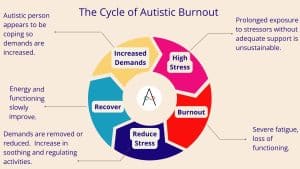Are you a parent in Autistic Burnout?
If you are a parent in Autistic Burnout you might have seen a lot of advice on how to recover from Autistic Burnout and felt completely lost. So much advice is about taking a break and engaging in activities that nourish you. How does that work if you’ve got children to look after? What if you don’t have support?
In this article I will cover:
- Why this isn’t your fault
- Ways of taking a break
- Making the most of breaks
- How to rest when you can’t take a break
- How to make life more sustainable
1. It’s Not Your Fault
First of all I want you to know that if you are struggling with parenting your children in Autistic Burnout its not your fault.
Parenting can be hard at the best of times, even when you are feeling well and have money and practical support to help you.
If you don’t have support to take a break, rest and recover from burnout then you are not failing, you are being failed. There is not enough support for Autistic parents in Autistic Burnout.
We need to move towards a society that better understands the needs of Autistic parents and puts support in place before we reach burnout.
In the meantime I have some strategies and resources to help you now.
2. Ways Autistic Parents can Take a Break
If your children go to school:
Try and make the best use of this resource. Book breakfast clubs and after school clubs if they are available to you. If this is not financially viable the school may be able to provide assistance if you speak to them, email or get someone else to contact them on your behalf explaining your situation.
If your child receives school dinners or can receive school dinners then make the most of these and provide them with an easier evening meal.
Consider booking your child into holiday clubs to give you a break during school holidays.
If you live with your childs other parent
Consider negotiating some child free time with them. Could you go and stay in a hotel or with a friend or relative, even if its just for one night, it may help you to decompress and feel less overwhelmed.
If you can’t leave your family for that long then consider negotiating half a day at the weekend or an evening each week where you are free to do what you want. Even if you have to repay the favour you might find that making a few hours of time and space helps you cope better. Sometimes just half an hour by yourself a few times a day can make the rest of the day more manageable.
If your child has a trusted friend or relative
Consider asking if they can go and stay with them. They could go for a weekend or short break, or if they are at school, someone could come and stay in your home while you go away.
If you don’t have any support at all
Consider the times of day when your children need less from you. There may be times when they are immersed in a task or sleeping when demands are lower. You might be able to negotiate ‘quiet time’ with older children when they don’t disturb you unless its an emergency. Don’t be afraid to offer electronic devices or snacks to give yourself a break.
3. Making the Most of Breaks
It’s easy to use up every spare moment in a busy household with chores, life admin and things like social media. Try to notice moments when there are no urgent demands on you and make the most of them.
Think about what would be the most replenishing use of your time. It may help to plan for this in advance, for example “if I get 10 minutes to myself I will sit outside with a cup of tea” or “if I get 5 minutes I will do a quick yoga flow”. Try to use the time in a way that is kind to yourself and that makes space for your needs in that moment.
4. How to Rest When you can’t Take a Break
Taking a break with your children is no substitute for child free time but there are some things you can do to help.
Find activities that you and your children can do together that replenish you, or at least don’t drain you too much.
For Example:
- Sitting and watching a film together
- Colouring
- Drawing,
- Gardening
- Going for walks
- Making mud pies
Depending on your sensory needs you might find some activities help to regulate and soothe you and your child at the same time.
For Example:
- Slime
- Playdough
- Lego
- Yoga (check out cosmic kids yoga on YouTube)
- Karate
5. How to Make Life more Sustainable
Lowering your standards
It is very easy to get stuck on rules and standards that you developed at a time when life was easier for you. You might be applying neurotypical standards to a neurodivergent household. For example how often you:
- Clean your house
- Cook from scratch
- Eat together at a table
- Go out on day trips
- Provide activities for your children.
These standards may be based on what you think you should be doing rather than what you and your children actually need. Think about what the absolute minimum standards need to be. For example, keeping them safe and feeding them. Then add in things that are not essential, but make life easier, for example: Tidying up the house, doing laundry at regular intervals and providing an activity if it means your children will be happy to rest afterwards.
Try to develop some routines and structures for you and your children so you know what to expect and when and so they know what they need to do without you having to tell them all the time.
Be honest with your children
It can feel awful to not have the energy and enthusiasm to engage with your children. Remember this is not your fault and it is not theirs either. Explain to them in simple terms that you are feeling tired and that you might not be able to do as much as usual.
For older children you might be able to have a conversation around how you can work together to make things as easy as possible. For example saying “i’m feeling really tired today, its not your fault but how can we make today as easy as possible for both of us?”
Seek out support
Depending on where you are in the world there will be different sources of support available to you. It is worth checking with local organisations about what support you might be able to access, both practical and financial. There is also a community of Autistic Parents online struggling with the same things you are. It might help to reach out to an organisation such as Autistic Parents UK to join one of their support groups or finding a facebook community for autistic parents.
My Autistic Burnout Recovery Membership will also take into account the needs of Autistic parents who want to recover from and prevent autistic burnout and you would be very welcome to join us.











